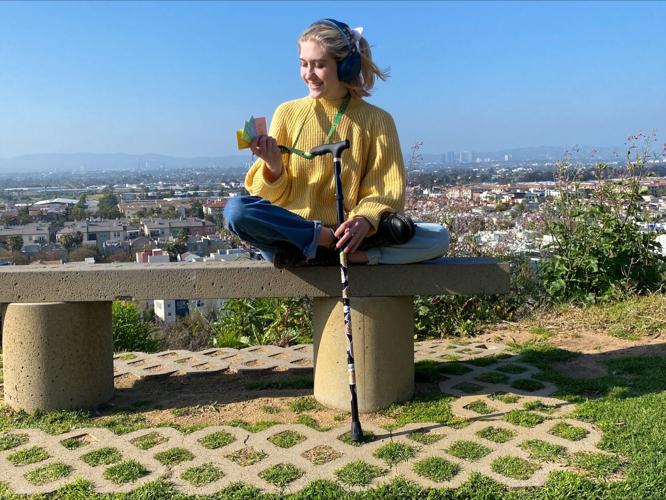
JP Powell sits on the bluff with their cane, situation cards and noise cancelling headphones. Photo via JP Powell.
Growing up in southern Orange County, California, there was always one word that JP Powell, junior animation major, was forbidden from saying.
Autistic.
They heard the word for the first time in preschool, but not from an autistic student. Students shouted on the playground, bullying preschoolers with the word.
Powell knew the power of the word; despite not fully understanding what it meant at the time, they knew not to repeat it. They had made a friend who was diagnosed with autism, and promised never to tell anyone. “It had to be kept very secret because people were ashamed that she had it, like it's some disease,” they explained.
Keeping this secret left Powell believing from a young age that if anything is perceived as different, it’s always safest to hide it. This realization caused deep internal conflict in their early life. “I never saw anything wrong with my friends. Why did I suddenly have to, like, not tell people about this thing about her because I didn't see anything wrong with her at all,” they said.
Since those days in preschool, Powell was diagnosed with autism themselves. This journey has officially been two years in the making. They were first advised in middle school to explore a diagnosis, but felt most liberated to do so after entering adulthood.
Powell is proud of their diagnosis, and believes it’s truly allowed them to know themselves more than they ever have.
They found receiving the diagnosis felt most like reading the book “Heroes of Olympus,” a novel where each chapter is told from a different perspective. They felt before their diagnosis, they were only reading one perspective, and afterwards they were finally privy to read all of their own perspectives. This realization enabled them to start “understanding why I would have mental breakdowns all the time growing up — why I would feel certain types of pain,” they explained. “it's very overwhelming, but it's also really enlightening.”
Today, Powell uses aides for their autism to make their daily routine and spaces more accommodating. They sport black noise-canceling headphones adorned with stickers of ladybugs, stars, a gold infinity symbol and one of their favorite cartoon characters, Peridot, from "Steven Universe." A sunflower-patterned lanyard houses situation cards to help alleviate any difficulty in various situations. In their possession, Powell is known to wear different kinds of glasses along with their cane to make all spaces accessible.
Powell has never connected with heteronormative things, and has found indefinite overlap in their experience coming out and their autism diagnosis. “I've always been fluid in my identity of gender, and also my sexuality just because binary social rules aren't a natural experience to me.”
They first started the extent of their research in the seventh grade, and through their recent advocacy, they’ve long identified with the term 'neurodivergent.' Neurodivergent is a larger umbrella term including more disorders than just autism. Powell noted the neurodiverse community comprises of people with ADHD, dyslexia, premorbid disabilities and other disorders.
Powell sees themselves as a part of the neurodivergent community, but since much of their activism and research resides specifically with autism, that has often taken their prime focus. They shared, “Whatever I'm doing in my life, like whether it's just a class for my major or my core classes, I want to incorporate this experience somehow.”
Though proud to be an advocate for their community, Powell has been warned about the risks of doing so. People in the entertainment industry, the field they're entering, have told Powell, “If you're going to be open about this, you need to be ready. And you need to be working like 10 times harder than everyone else around you."

JP Powell lies across their desk at the computer while wearing their noise cancelling headphones. Photo via JP Powell.
They don’t want to hide their diagnosis, but in some spaces sometimes the safest option is to mask their autism. Powell was quick to say that the discrimination they face “is not anywhere near as intense or scary, or violent as other people in the autistic community.” With this clarification, they addressed the privileges they’ve identified. “First off, I'm white. I can [present] woman passing. I also can pass off as neurotypical passing if I really, really, really, really, really try,” they explained. In acknowledging their privileges, they shared how they hope to use their agency to be an even stronger leader and voice for their community, but it hasn’t been easy — especially on campus.
“It's not like I can easily just ignore the fact that I see people staring at me all the time,” Powell said. The discrimination and micro-aggressions they face have long distracted them in class. “When I'm using my aids and learning, my peers won't talk to me, or they talk to me [like] a toddler. They congratulate me. They're like, 'Good job for that answer,'" they said.
Powell’s journey of discovering their own identity and reaching their diagnosis has presented a plethora of challenges, especially on campus. All of that aside, they know this is the work they're supposed to be doing. “I can't just live my life knowing this information and not doing anything about it, especially when I do have the privilege that I do.”











(0) comments
Welcome to the discussion.
Log In
Keep it Clean. Please avoid obscene, vulgar, lewd, racist or sexually-oriented language.
PLEASE TURN OFF YOUR CAPS LOCK.
Don't Threaten. Threats of harming another person will not be tolerated.
Be Truthful. Don't knowingly lie about anyone or anything.
Be Nice. No racism, sexism or any sort of -ism that is degrading to another person.
Be Proactive. Use the 'Report' link on each comment to let us know of abusive posts.
Share with Us. We'd love to hear eyewitness accounts, the history behind an article.